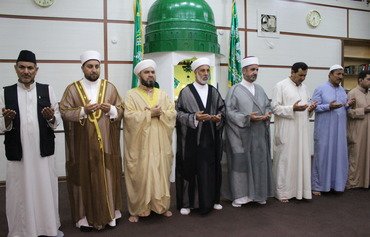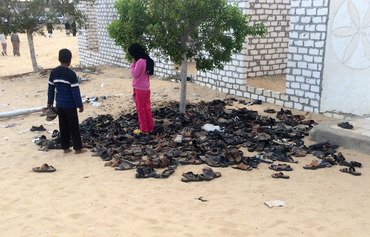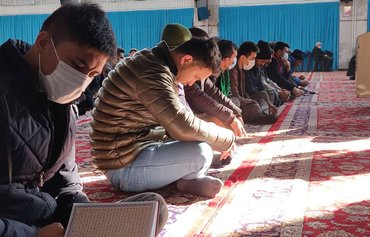Since June 2016, Fallujah's Sufis have gradually regained the ability to resume the open practice of their faith.
In those months since the ouster of the "Islamic State of Iraq and Syria" (ISIS), obstacles to worship have been removed and the sound of drums that accompany Sufi hymns can once again be heard.
The Sufi population suffered under the rule of ISIS, which deemed them heretics, killing many and forcing hundreds to flee to central and northern Iraq.
After ISIS entered Anbar, adherents of this mystical strain "were brutally killed after the terrorist group deemed them idolaters and infidels in Fallujah", said Muath Yousif, a Sufi vocalist.
"Amidst such conditions, Sufis would nevertheless practice their rituals secretly," he told Diyaruna, adding that with ISIS gone, "everything has completely changed" and Sufis can now practice their rituals without fear.
Sufi worship involves religious hymns and spiritual meetings to conduct dhikr, the recitation of short prayers, he said.
With ISIS out of the city, "tikyas" -- designated spaces for Sufi dhikr sessions -- are open and are even able to publicly announce schedules for their dhikr sessions, he added.
A history of tolerance
Fallujah historically has embraced followers of the Sufi path, Yousif said.
The city is known for being home to different religious schools, said Tariq al-Abdali, head of the Sunni Endowment in Fallujah.
"Everyone was always free and safe to practice their rituals," he told Diyaruna.
Fallujah's central location and its proximity to Iraqi army bases in Baghdad, al-Habbaniya and Ramadi, have made it a meeting point for Iraqis from a variety of provinces, al-Abdali said.
This has transformed the city into a melting pot of religious sects, he said.
Fallujah has been portrayed as an extremist hotbed, he said, stressing that this is not the case, and that the local population resisted ISIS's incursion.
"The locals did not allow for this to happen, and they themselves were victims of the extremists," al-Abdali said.
Security protects freedoms
"The stable security situation in Fallujah was one of the most important factors that has helped the residents of the city perform their rituals freely and without fear," Anbar provincial council member Naeem al-Koud told Diyaruna.
The solidarity of the local population has contributed to a tolerant atmosphere, as Fallujah residents have been long known for their diversity, he said.
"Today, locals are willing to defend their neighbours of other faiths and sects," he said, adding that this is "nothing new" for Fallujah.
In order to maintain such cohesiveness, "tighter security and legal procedures that would prevent extremists from returning to the streets of Fallujah" are required, al-Koud said.

![Iraqi Sufis take part in a ritual ceremony to commemorate the birth of the Prophet Mohammed in the town of Akra in this file photo from January 1st, 2015. [Safin Hamed/AFP]](/cnmi_di/images/2018/02/01/11245-Iraqi-Sufis-Akra-600_384.jpg)






